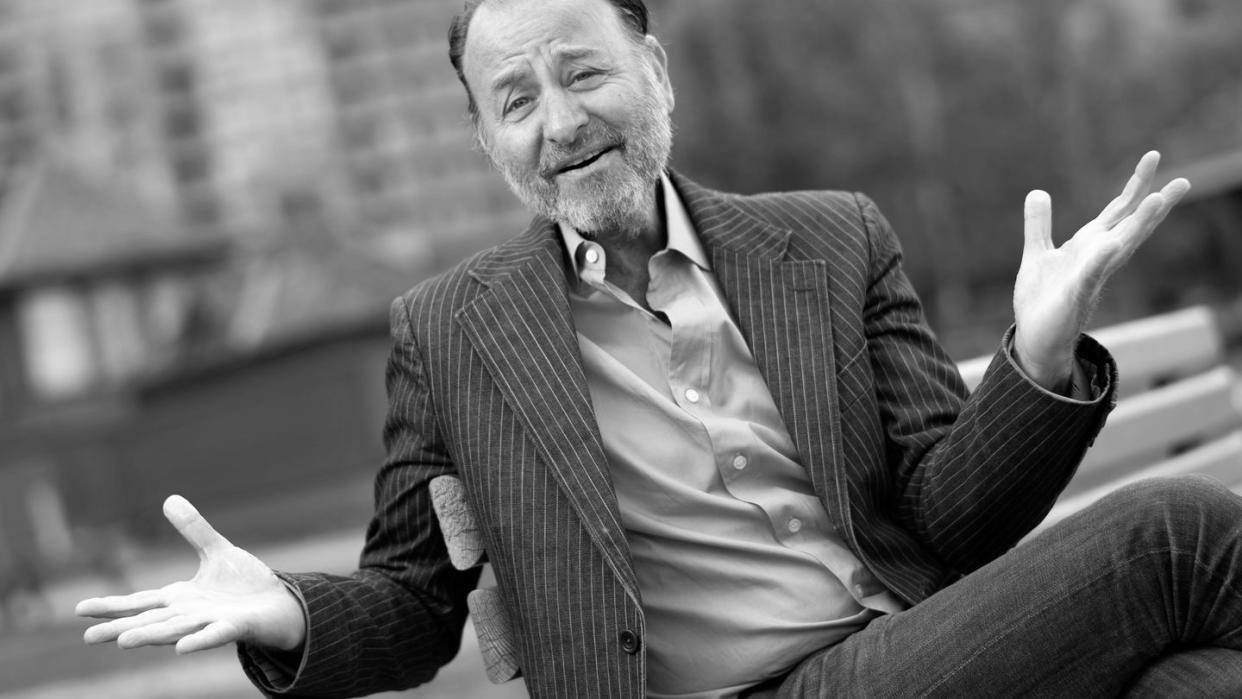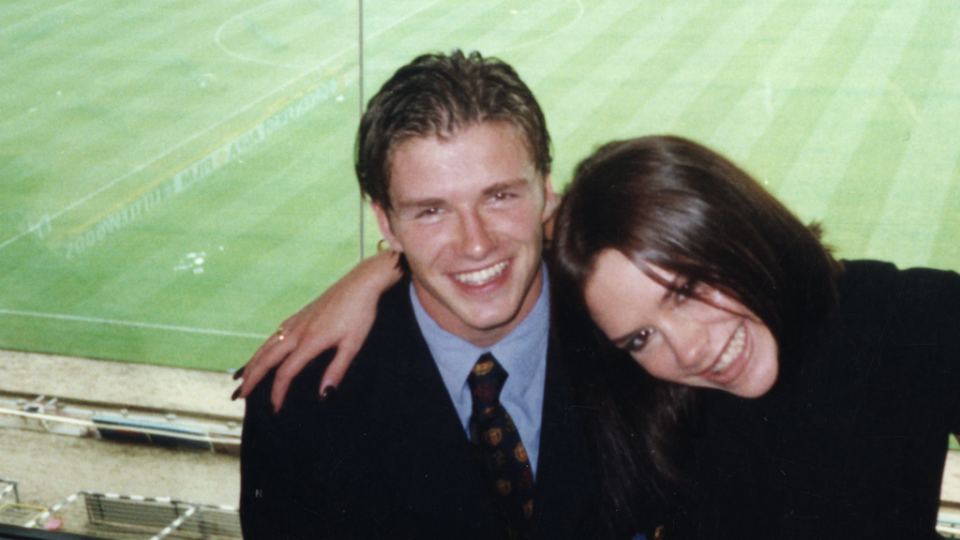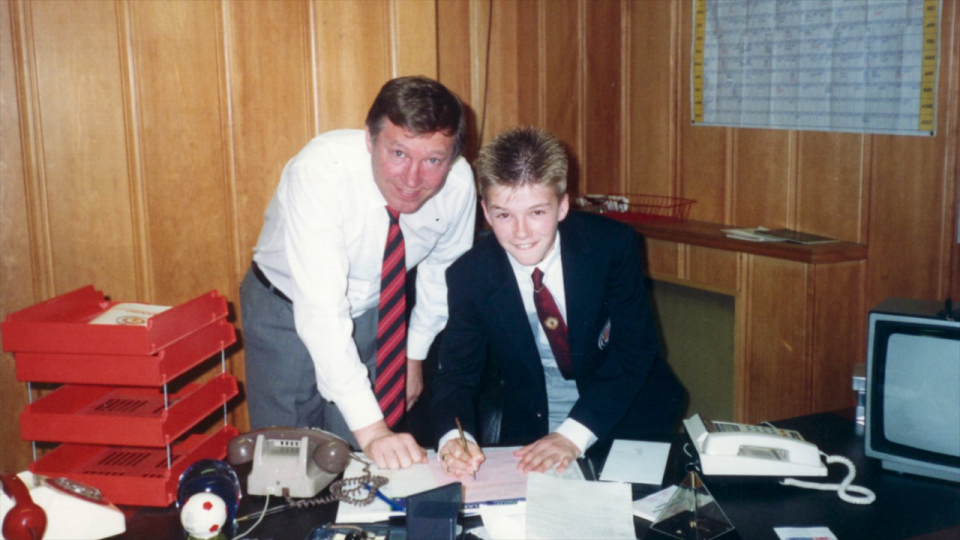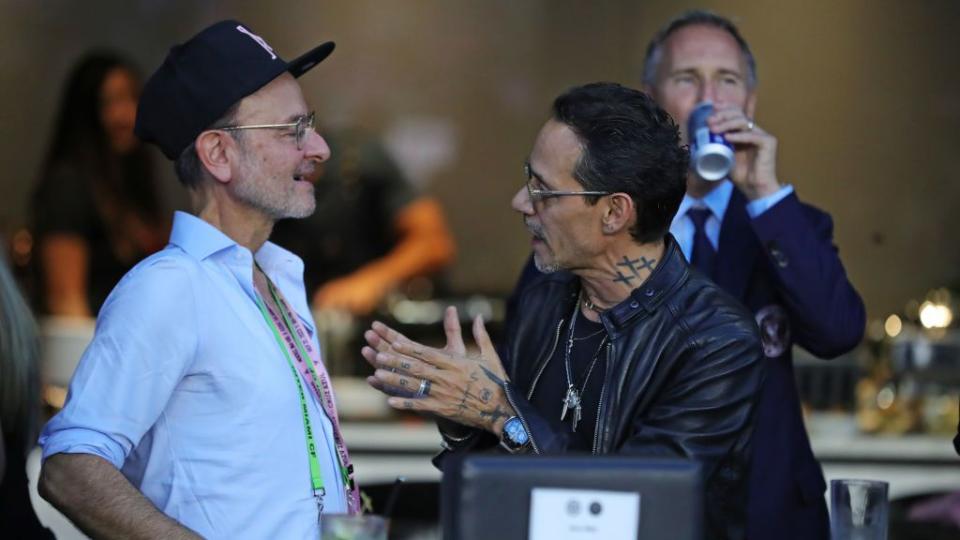Fisher Stevens is the Sports-Documentary Savior We've Been Waiting For

- Oops!Something went wrong.Please try again later.
- Oops!Something went wrong.Please try again later.
Fisher Stevens, the multi-hyphenate actor and director who most recently starred as Waystar Royco’s insecure PR exec in Succession, didn’t set out to make a docuseries about David Beckham. In fact, it wasn’t even his idea: Netflix approached Beckham about the opportunity. He said yes, and then some time later, he went out for drinks with his pal, Leonardo Dicaprio. (Oh, to have been a fly on the wall of whatever dimly lit bar they were in that evening.) “David told Leo he’s looking for a director,” Stevens recalled to me over a recent phone call. “Leo said, ‘You have to hire Fisher.’”
Stevens and DiCaprio previously worked together on Before the Flood—a 2016 climate change documentary that was directed by the former and narrated by the latter—so DiCaprio knew Stevens was a massive football fan. But Stevens didn’t really care about David Beckham. “I love football, but I got into it the year Beckham left for Madrid, so I didn't really know about how great he was,” Stevens said. “I didn't know much other than that he was really pretty, had a beautiful wife, and sold a lot of products.”
"I felt really bad," he added, perhaps laughing at the improbability of those first impressions given what he now knows about whom the Brits cheekily refer to as Golden Balls. Eventually, Stevens came around, and the end result is Beckham, streaming this Wednesday on Netflix. The fast-paced, four-part docuseries tracks the life and times of Beckham—a man who, for better or worse, can’t seem to slow down.
Oh, and you think Stevens was soft on the footballer? Not one bit. "There's a lot of things he asked me to change that I didn't," he says. Below, Stevens says how he pulled it off. This interview has been edited and condensed for clarity.

ESQUIRE: What eventually made you come around to the idea of directing this docuseries?
FISHER STEVENS: I went to work [on Succession] and asked Jesse Armstrong and Tony Roach about Beckham. We would talk about football every day. They were like, “You have to do it. He’s a genius. He was a great player.” I started researching him and said, “OK, I'll meet with him,” and the rest is history. I was happy that was the way it happened because Leo and the guys on Succession did get me more interested. I also think that David wanted an American or a non-British person to do this because I didn't have any baggage coming in.
What do you mean by baggage?
Baggage meaning the British people have a very strong point of view about the Beckhams, for good and bad. I think he was afraid that a filmmaker who was very familiar with them may bring their own kind of story. I didn't know anything about them. You hear my voice. I play the audience by letting them tell the story. But I tried to tell the story in a different way, and I tried to listen. I said, “If we're going to do this, you really got to open up to me. You can’t be that guy—that pretty boy in all the commercials. Really be you.” Because as I got to know him, I was like, “You're really different in person. You're a good dude. You're sweet, you're open, you're kind, you're intelligent in a different way, and you're very emotional. I didn't know you were even capable of emotion.” And he is. He's all of those things, and he gave me a lot of time. I spent two years on this journey with him.
You mentioned Beckham approached you about the project, so clearly he wanted to make a documentary about himself. Did you feel like you had to guard against his own self-interest for the integrity of the project?
Yeah, that was a constant. I constantly had to make sure I wasn't making a branded Beckham film. I made parameters. I told David he couldn’t have the final cut. The fact is: I've made documentaries about people that didn't necessarily want me to make documentaries about them, and that is a much worse position to be in, because you're fighting to get the information.
The fact that he didn't have final cut, committed to so many interviews with me, and gave me so much time made me feel better. But I never wanted to do a commercial for them. I wanted to tell a story about this kid from East London who comes from a very meager background and becomes one of the biggest global superstars ever in our lifetime.
Beckham didn’t have final cut, but he is a producer on the film. His production company, Studio 99, is mentioned in the opening credits. Were there things that weren’t included because of his involvement?
Let me put it to you this way: There's a lot of things he asked me to change that I didn't. And there's a couple of things he asked me to change that I did. But it was more to be sensitive—and it wasn't about him. He gets pretty uncomfortable in the fourth episode.
There were multiple confrontational moments in the series. I’m thinking of the scene with the teammate who said David had to admit that Victoria was a distraction from football. Was it awkward when you brought that up to David?
Oh yeah. David really believed she wasn't a distraction. 100 percent.

Netflix only provided the first two episodes. Do you eventually discuss some of Beckham’s major controversies, like his recent role as an ambassador to the Qatar World Cup?
I talked to him about Qatar. I excluded it from the film not because of whatever his answer was. I just didn't have room for it. In the end, I didn't think it was important to our story. It had passed and the Messi story took over. Had the series been coming out before the World Cup, I would have put it in. He also waited in line at the queen's funeral for 14 hours, and I didn't include that either. If we had a fifth episode, I probably would have put all that stuff in, but we ran out of runway.
Tell me more about your runway. Once you had all your material, how did you decide where the story begins and ends?
I always wanted it to end with football. I wanted it to end in Miami because that's one of the biggest things he's doing. He's still doing what he loves—he's just not playing it. He's running a team. The movie was already finished when Messi came, but I managed to reopen it and film his first game. I also knew I wanted it to end with family because his family has been so important. David cooks these Sunday lunches for his family, so I asked him early on if I could film one for the ending. I didn't know how it was going to end up. It came out very differently than I expected, to be honest.
We hear your voice as the director a fair amount throughout the series. Tell me about those creative decisions. Were you trying to earn the audience's trust?
Yes, that's exactly right. I also wanted the audience to feel comfortable with the simplicity of the questions and the stupidity of me being the “dumb filmmaker” who doesn't know anything. Obviously, I try to not be in it too much, but I like that the audience feels like I’m discovering things with them. And it made David feel comfortable. He liked our back and forth. He enjoyed it because he's funny. He's not Victoria funny. Victoria is really funny. But David has a good sense of humor, and it allowed him to feel comfortable. It’s a tonal thing for the film, too. It makes the film snappier and lighter, even during the heavy moments.

Sports documentaries have come under fire recently for their one-sided or incomplete portraits of their subjects. I’m thinking of The Last Dance and the issue of editorial independence—as well as Netflix’s Naomi Osaka, which critics felt failed to present a full portrait of the young tennis star. I imagine you were aware of these criticisms. Did they weigh on you?
For sure. That was a condition of making the film with David. Look, there were times when I finished a three-hour interview, we’d get in the editing room, and I’d feel like we could’ve gotten a better answer. I wanted to go deeper, so I would write to him and say, “Next interview, we’ve got to go deeper on this.”
How did Victoria feel about the project?
Victoria reflects more than David. She said in one of the later episodes, “we felt like different people back then.” I was asking these questions about David's career that Victoria hasn't thought or talked about in a long time. I think whenever I would leave the interview, they would start talking about stuff, like, “Remember that moment, and remember that time in Los Angeles.” It definitely brought stuff up for both of them.
Did you ask them about the affair allegations?
Yeah. We get into it. More from the point of view. How did you guys stay together? Because it is a love story.
Do you feel like this is a work of journalism?
No, I'm not a journalist. I'm a filmmaker. It would have been a different film if I were a journalist. I make movies—and I look at all my films as movies—whether it's a documentary or fiction. But for me, it's all about being truthful and honest and getting your characters to tell their story in an open and emotional way.
It’s interesting. Journalism schools still teach documentary filmmaking—and some documentaries, like PBS’s Frontline series, fit that mold. But a lot of what the streamers release as documentaries today perhaps isn’t what the average person would consider to be journalism. The definition is clearly expanding.
I mean, is Grey Gardens a documentary? All documentaries are so different. Another one of my favorites is Burden of Dreams by Les Blanc, which follows Werner Herzog around while he makes Fitzcarraldo. These were my influences. Now, a portrait of David Beckham is very different from Werner Herzog making a movie in the middle of the Amazon in 1978, right? But that's not the kind of movie I wanted to make. I wanted to make a character study of this iconic individual.
What other documentaries or films did you look to for inspiration?
I was inspired by Senna, but Senna doesn’t have any on-camera interviews. Ironically, I better knew what I didn't want to do. I didn't want to make a sports documentary. I didn't want to make a football documentary. I wanted to make a personal portrait documentary. I was inspired by opera too, like the ups and the downs of La Bohème and Turandot. My editor, Michael Hart, and I saw eye-to-eye in terms of the tone and pacing. We would talk about the film in terms of movements.
Do you think you and David had the same goals for the series? What were his goals?
I kept asking him, "Why are you doing this, man?"He never said this, but I think the real reason is he needed to take time to reflect and look back on his life. He would have never done it if I didn’t sit him down on the couch and ask him about it, because he won't go to therapy. I really believe he wanted a movie about him to come out, where he could tell his own story. There have been a couple of movies that have already come out on YouTube—people just putting together clips of him. To be honest, Netflix approached him first. They approached him to do a documentary, he said yes, and then he needed to find a director.
Is he getting paid for this?
I don't know if he's getting paid. I think it's more of an archive thing. We use his personal archive. Like I said, he did not have final cut.
Do you think Beckham likes the final product?
I think he likes it. Some of it's very difficult for him to watch, but that's good. That'll be good for the audience. I don't know. How do you wrestle with that as the director?
Do you want him to like it?
I want him to think that I painted a fair, honest portrait of who he is—and that I made a movie that’s fucking exciting and that people want to see. Because David doesn't fuck around. He wants everything to be perfect. He wants a good movie.
You Might Also Like

